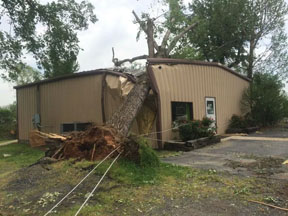
Photo courtesy of Dr. Robert Wadley
Dr. Robert Wadley assumed his practice was gone after a tornado tore through Mayflower, Ark., on Sunday. Turns out, a tree fell through the roof but left much of the building standing. "We are very lucky," he said by phone. "We fared really well compared to other nearby businesses."
Tornadoes and storm activity during the past few days leveled homes in seven states, claimed at least 34 lives and damaged veterinary practices in Arkansas and Mississippi.
A half-mile-wide twister touched down Sunday in Arkansas, churning winds that sent a tree through the Mayflower Animal Clinic. Phones aren't yet working in the area, but owner Dr. Robert Wadley put a call out on Facebook for injured animals. He considered setting up tables outside the damaged clinic to provide triage and basic care to animals impacted by the storm but was rebuffed by authorities.
"They aren't letting me stay at (the) clinic," he wrote on Monday. "If you need my help, bring your animals to Mayflower City Hall. Thanks."
A four-hour drive east, Dr. Laurie Dilworth's practice in Tupelo, Miss., sustained damage on Monday. She couldn't be reached for comment but like Wadley, noted on Facebook that the practice will continue to operate, despite setbacks.
"We sustained some damage during the storm today but we are so blessed that no one was injured and all the animals are safe and sound," a Facebook post said. The practice was scheduled to reopen the next day.
Another expectation: more tornadoes. According to the National Weather Service, eight tornadoes touched down in North Carolina late Tuesday. Severe weather is anticipated to continue throughout Wednesday.
Whether it's tornadoes, hurricane, mudslides, earthquakes or something else, veterinarians should expect to face a natural disaster at some point in their careers, said Dr. Ben Leavens, a veterinarian who lived through a tornado that in 2011 destroyed his Joplin, Mo., practice and killed 158 residents. Preparation beyond a general evacuation plan is a must-have for practitioners who might one day face mass numbers of injured or displaced patients, he said.
He has headlamps, tarps, batteries, blankets, towels and first aid supplies at the ready.
Dr. Bonnie Toner, an associate at the Emergency Veterinary Clinic of Southwest Missouri, doesn't consider that to be excessive. After a tornado touched down several years ago in Springfield, Toner sought preparedness advice from state emergency management officials. They, in turn, stipulated that in case of a disaster, the Emergency Veterinary Clinic of Southwest Missouri could set up an intake shelter at any place the American Red Cross shelters people.
But there was a catch; the Red Cross in Missouri does not permit animals in human shelters. So Toner coordinated emergency shelter plans with about eight nearby clinics and assigned her practice's office manager to communicating with emergency-response personnel.
Her plan was tested in 2011, when Joplin was leveled, prompting veterinarians around Springfield to help aid tornado victims. Afterward, she sought the help of Leavens to implement disaster preparedness revisions.
One thing she's learned: Expect that things might not go as planned.
"Even though this is what we planned for, it may turn out to be completely different as far as setting up for our intake," Toner said. "The amount of help you get from outside agencies differs. We purchased foldable crates after Joplin. We had a drill with the Red Cross where they opened a mock intake center, and we changed a lot of things after that.”
Toner keeps "grab and go" boxes of disaster supplies on hand. The kits typically include first aid supplies, euthanasia solutions and other medications, forms and a lock box of controlled substances. She rotates the supplies every six months and checks expiration dates.
Dr. Michael Shorter, a volunteer with New York City's Veterinary Emergency Response Team, suggests teaming up with colleagues in the area to map out a contingency plan based on county or regional needs, depending on the type of disaster. "They could share supplies, medications, who has generators, emergency lights, etc," he said.
Leavens, the practice owner in Joplin, recommends that veterinary practice acts be amended in states that don't already permit out-of-state veterinarians to help during times of need.
On May 22, he plans to sit down with his staff to remember the tornado that destroyed Joplin and hundreds of lives three years ago. They'll review the practice's disaster plan in hopes of never having to use it.
"That would be a good day to do that," he said.